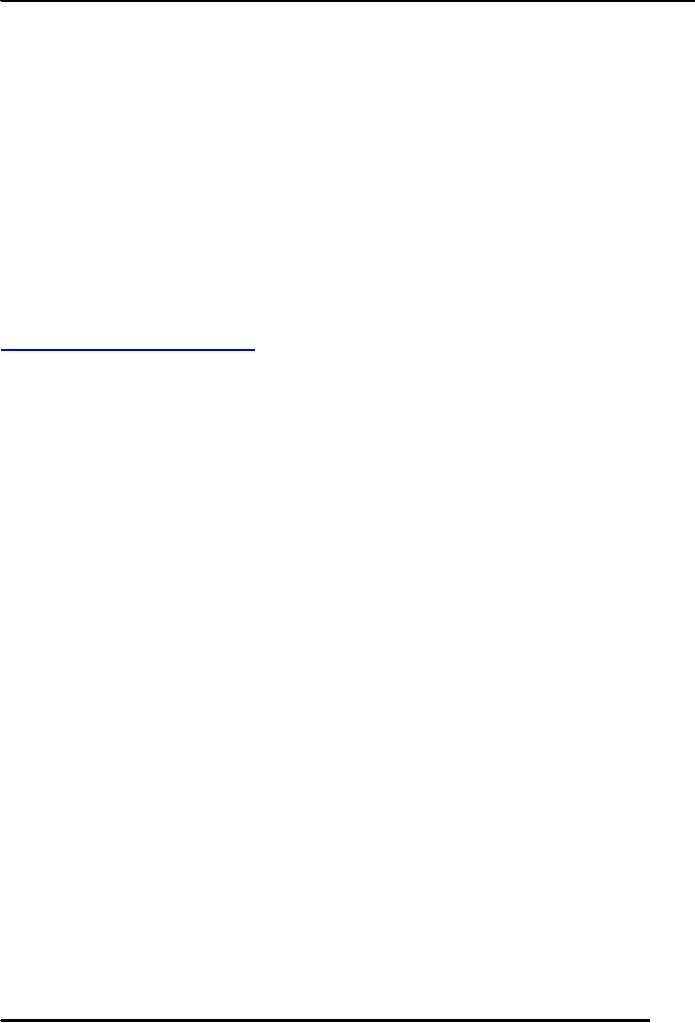 |

Human
Relations MGMT611
VU
Lesson
41
ENHANCING
PERSONAL ETHICS-2
Ethics
in Relationships
Rules
are made to improve the efficiency
and productivity whereas
ethics improve the quality of
human
relations.
Ethical
conduct
Professional
ethics can be understood as the rules of
conduct that translate the profession's
characteristics
ideals,
or ethos, into everyday
practice. (Cartel & Denhardt,
1989)
If
you follow the rules given by
society, you will be more
successful in life and more
useful for your
organization.
The truth is that good
ethics sometimes is good
business, but sometimes it's
not. It depends
on
one's goals and how
one defines good business.
Sometimes, good ethics can
end in bankruptcy. Of
course,
so can bad ethics. A fairer
statement is that good
ethics can be a very powerful
business asset and
that
good things tend to happen to
companies and individuals
that consistently do the right
thing and bad
things
tend to happen to those that
even occasionally do the wrong
thing. But the crucial point
is that the
moral
obligation to live according to
ethical principles is not dependent on
whether it's advantageous.
People
of character do the right thing in the
pursuit of virtue, not
self-interest.
Common
ethical problems
Here
we discuss some common
ethical problems that one
has to face in
workplace.
1.
Dealing
with confidential information. One should
be careful while dealing
with confidential
matters
of the organization.
2.
Presentation
of employment information (many people
lie or distort information). Do
not hide or
distort
any information when you apply
for the job.
3.
Use of
corporate resources (e.g. using
company resources for
personal benefit).
Companies'
resources
should not be used for
personal benefit.
4.
Misuse
of computers and information technology
(including piracy). Technology should
not be
misused.
It is unethical.
5.
Choosing
between two rights: Dealing with
defining
moments. Sometimes
one has to face the
dilemma
of
choosing between two rights.
Under such circumstances,
only ethics can help
you decide
which
way to go.
Guidelines
for Behaving Ethically:
Developing the Right
Character Traits
Momentary
and short term goals can be
achieved by adopting unethical behaviour.
Ultimately they will
harm
you and your
organization.
1.
Be honest. This
is the best policy to be successful in
all walks of life.
2.
Demonstrate integrity. Avoid
compromising on principles all the time.
3.
Keep promises. Develop
trust by keeping promises.
4.
Be loyal. This is the
most important attribute in a
human personality.
5.
Be responsible. One should
take the responsibility of the actions
taken by one.
6.
Pursue excellence. Try to
perform in the best possible
way what he/she is expected to
do.
7.
Be kind and caring. This
sort of attitude brings peace in
life.
8.
Treat all people with
respect. Be
cautious while dealing with
people. Give them due
respect.
9.
Be fair. Make
it a part of your ethical
standards.
10.
Be a good citizen.
Avoid undesirable
activities.
Guidelines
for Behaving Ethically:
Following a Guide to Ethical Decision
Making
These
points are of great importance,
while taking
decisions.
1.
Gather the facts. If you
have collected the right
information and facts then
you will be able to
take
right
decisions.
2.
Define the ethical issues. It
will help you taking
right decision.
3.
Identify the affected
parties. Keep
in mind that is going to be affected by
your decision.
126

Human
Relations MGMT611
VU
4.
Identify the consequences.
Think
about what can be the result of
your decision.
5.
Identify the obligations. Who is
obligated to do what?
6.
Consider your character and
integrity.
7.
Think creatively about your potential
actions. You
can minimize the bad consequences
by
thinking
creatively.
8.
Check your intuition. Whenever
you make any decision,
use your intuitive skills.
It will help you
in
taking good
decisions.
9.
Developing strong relationships
with work associates. (e.g.,
two people with strong ties
to
each
other are more likely to be
honest with each
other.)
10.
Using corporate ethics programs.
(e.g.,
a committee that monitors
ethical behavior and an
ethics
training
program)
11.
Follow an applicable code of professional
conduct (e.g.,
"A legal assistant must
protect the
confidences
of a client...") an ethical relationship is a
basic and trustworthy relationship
between
persons
and organizations.
References:
Denhardt,
G. K. & Carton, L.B. (1989). The
Management of Ideals: A Political
perspective on Ethics.
Public
administration review, Vol. 49, No
2.
http://www.quoteland.com/author.asp?
Dubrin,
A.J. (2005). Human Relations:
Career and Personal Success.
Upper Saddle River, New
Jersey,
07458.
127
Table of Contents:
- HUMAN RELATIONS:Some Guidelines for Effective Human Relations, Communication has 3meanings
- CULTURE AND PERSONALITY:Definition of sub culture, Definition of Personality, Types of Persons
- PERSONALITY AND STRESS:Personality, PERSONAL TOOLS TO CONTROL STRESS
- PERCEPTION AND INDIVIDUAL BEHAVIOUR:Three concepts of personality, Bias in Perception
- PERCEPTION AND GROUP BEHAVIOR:Characteristics of Groups, Individual and Group Behavior
- ATTITUDE AND BEHAVIOUR:Types of Attitudes, Steps to turn attitude into action
- PERSONAL MOTIVATION AND ACHIEVEMENT:Needs and Motivation, Self-discipline and motivation
- SOLVING PROBLEMS SKILLFULLY:Problem solving and cognition, Ways to solve problems
- CREATIVITY IN PROBLEM SOLVING:Barriers to creativity, Tips to solve problems creatively
- HANDLING PERSONAL ISSUES:Self-Defeating Behaviour, Positive attitude to tackle personal problems
- CONFLICT RESOLUTION:WHY SO MUCH CONFLICT EXISTS, TECHNIQUES FOR RESOLVING CONFLICTS
- COMMUNICATION AND HUMAN RELATIONS:Process of communication, Improving gender barriers to communication
- ORGANIZATIONAL COMMUNICATION:To improve listening skills, Types of organizational communication
- UNDERSTANDING COMMUNICATION STYLES:Modeling communication style, Sociability continuum
- SELF-ESTEEM:Building process of self-esteem, Self-esteem and public image
- BUILDING SELF-CONFIDENCE:The importance of self-confidence and self-efficacy, Balanced Self-Confidence:
- BECOMING A LEADER-1:Assessing leadership role, Traits and Characteristics of Effective Leaders
- BECOMING A LEADER-II:Theories of leadership, Developing leadership potential
- GLOBALIZATION AND CROSS-CULTURAL DIFFERENCES:Religious Values and Bicultural Identities
- IMPROVING CROSS-CULTURAL COMPETENCE:Strategies to improve cross-cultural relations, More steps to improve Cultural Relations
- BUILDING GOOD RELATIONS WITH MANAGERS:Impressing your manager, Coping with a problem manager
- BUILDING GOOD RELATIONS WITH CO-WORKERS:Make Co-workers feel important, Maintain Honest and Open Relationships
- BUILDING GOOD RELATIONS WITH CUSTOMERS:Salesperson Represents the Business, Approaching the Customer, Excuses vs. Objections
- CHOOSING A CAREER-1:Ten Myths about Choosing a Career, Attitude toward and Perceptions about Myself
- CHOOSING A CAREER-II:Choosing a career and developing a portfolio Career, Suggestions for career Preparation
- FINDING A JOB:Targeting your job search, The Internet and Résumé Database Services, Extreme Job Hunting
- SIGNIFICANCE OF RESUME:Major types of resumes, Electronic Submission of the Résumé
- IMPROVING INTERVIEW SKILLS:Successful interview, Knowing the employer or Organization
- IMPROVING WORK HABITS-1:Reasons of procrastination, Techniques for Reducing Procrastination
- IMPROVING WORK HABITS-2:Developing the proper attitudes and values, Time-management techniques
- NEW MODEL OF CAREER ADVANCEMENT:Career portability, HUMAN RELATIONS SELF-ASSESSMENT
- TAKING CONTROL OF YOURSELF:Develop Outstanding Interpersonal Skills, Business etiquettes
- EXERTING CONTROL ON OUTSIDE ENVIRONMENT:Important communication tip, Exerting control over the outside world
- MANAGING PERSONAL FINANCES-1:Your personal financial plan, Steps in budget making
- MANAGING PERSONAL FINANCES-2:Basic investment principles, Tolerance for Investment Risks, Types of investments
- ACHIEVING HAPPINESS-1:Finding happiness and enhancing your personal life, The key to happiness
- ACHIEVING HAPPINESS-2:The Five Principles of Psychological Functioning, Your mind and Happiness
- ACHIEVING HAPPINESS-3:Need for intimacy, Working out issues with relationships
- APATHY AND ITS REMEDIES:Let us try to understand the various definitions of apathy, Coping strategies for apathy
- ENHANCING PERSONAL ETHICS-1:Influence of Culture, Common ethical problems
- ENHANCING PERSONAL ETHICS-2:Common ethical problems, Guidelines for Behaving Ethically
- HELPING OTHERS GROW:Being a Nurturing, Positive Person, A list of mentoring behaviour, Coaching skills and techniques
- REVIEW-I:What is a Human Relation?, Meanings of Communication, Two types of stress, Some personal problem, Communication style
- REVIEW-II:Steps to build self-confidence, Globalization, Building Good Relations with Co-workers, Good work habits
- REVIEW-III:New model of career advancement, Choosing your investment, Tactics for Dealing with Difficult People